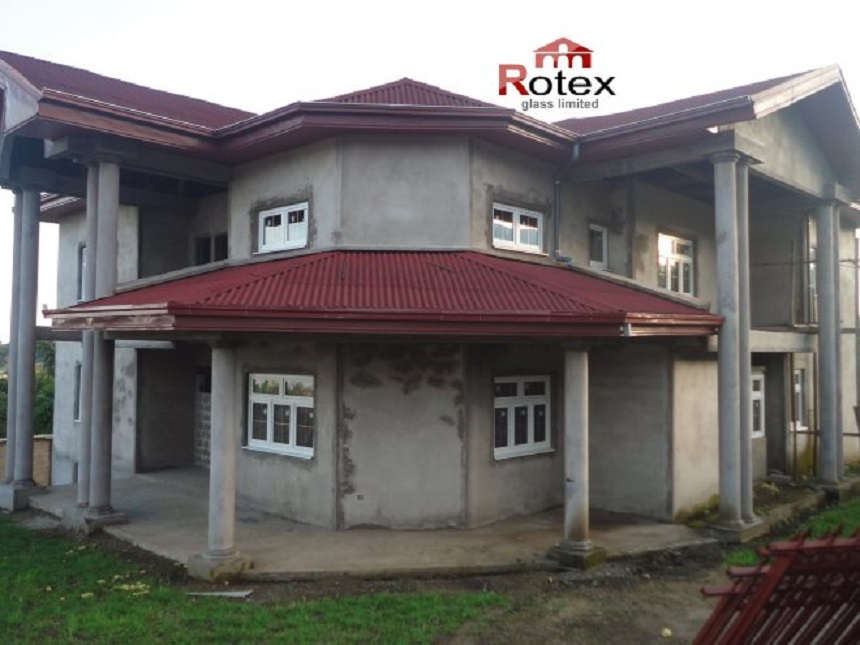General
Rotex Glass Unveils Dust, Noise Proof Windows

By Modupe Gbadeyanka
A firm renowned for different window innovations and technology, Rotex Glass Limited, a division of Rotex Group of companies based mainly in Europe, has taken its trade to the next level with the manufacture and installation of its new Homesealed innovative home window solution that offers up to 99 percent external noise reduction and zero dust penetration.
The innovation is called Rotex metal-uPVC windows, which are layered with a gas-filled space to absorb the noise and filter the sound as well as provide adequate thickness in the glass to eliminate dirt.
The windows consist of a spectacular noise and dust reduction feature thicker than an average double glazed window that has two panes of 3mm glass separated by a 6mm gas pocket.
They have greater gap using thick and laminated glass which improves the acoustic insulation quality or sound transmission glass and keeps outside elements out of the home or workspace, thereby protecting furniture, office equipment, and artwork. They are welded and have multiple chamber construction.
Reduction of noise is not so simple because noise pollution comes in different forms; air traffic, busy roads, construction noise, traffic noise and so much more. However, using Rotex double glazed windows can eliminate noise from a home by 99 percent.
Rotex uPVC windows control noise with the use of acoustic glass which reduces the sound wave’s energy.
The windows also provide insulation for collision and airborne noise as well as maintain the safety and security properties of laminated glass. They are best used for commercial and domestic buildings especially for skylights, patio doors, windows etc.
Rotex Limited has developed the double glazed unit glass solutions which are integrated into window systems. With the benefits of being highly durable, they are completely sealed to serve as a gap proof window system. Thus, preventing dust from penetrating the home and work environment.
Rotex uPVC windows eliminate 99 percent of dust, drafts, and dirt as small as 0.3 microns (bacteria, viruses, fumes, and pollen). They deliver maximum benefit of a high-efficiency and safe window.
One of the most amazing benefits of these windows is; they encourage a healthier lifestyle by discouraging the use of air purifiers.
General
Pastor Ogbueli’s Abuja Night of Glory Holds Today

By Blaise Udunze
Momentum is gathering for the Abuja Night of Glory taking place today, Friday, December 5, 2025, at the main bowl of the Moshood Abiola National Stadium.
The crusade is being hosted by Dominion City Church headed by Pastor David Ogbueli and it starts by 7pm.
The all-night programme will feature dynamic worship leaders like Nathanial Bassey, Dunsin Oyekan, Theophilus Sunday, Chioma Jesus, Kaestrings, Sunmisola Agbebi Okeleye, Minister GUC, Ebuka Songs, Anthony Kani, and DC Angels.
Reputed as a teacher of righteousness and anointed minister of the gospel, evidenced by the miracles that have trailed his ministry, and one who champions the cause of the poor through empowerment initiatives, Dr. David Ogbueli will be joined by renowned ministers from within and outside Nigeria, including Evangelist Andres Bisonni, Dr. Charles Ndifon, Evangelist Dan Scott, Apostle Ikechukwu Nnajiofor, and several others.
Night of Glory has, in previous editions held across Nigeria’s cities, recorded remarkable results, such as immediate healings and freedom from chronic ailments, recovery of vision and movement after many years of paralysis, along with liberation from dependencies and emotional distress. Numerous participants have also shared testimonies of breakthroughs and big personal changes after the experience. Organisers state that this year’s event, in Abuja, is anticipated to exceed previous editions.
The event is intended for all individuals trusting God for divine intervention in any area of life.
Understanding the role of faith in the destiny of individuals and nations, a dedicated prayer session for Nigeria will take place during the crusade to tackle some of the current challenges being faced in the country and also to uplift he leaders and institutions before God.
Attendance is free, and registration is encouraged via the QR codes on event banners. Organisers expect a massive turnout as worshippers travel from across the country for what is anticipated to be a transformative encounter.
Adequate security and free transportation have been put in place ALL over the city of Abuja, while those outside Abuja are expected to join online.
General
Rivers Speaker, 15 Other Lawmakers Leave PDP for APC

By Modupe Gbadeyanka
The Speaker of the Rivers State House of Assembly, Mr Martin Amaewhule, has defected to the All Progressives Congress (APC).
At the plenary on Friday, Mr Amaewhule joined the ruling party from the opposition Peoples Democratic Party (PDP), along with 15 other members of the state parliament.
This development comes some months after they had earlier declared their support for the APC in the wake of a crisis with the state governor, Mr Sim Fubura.
The lawmakers had an issue with Mr Fubura, which led to a state of emergency declared on the oil-rich state by President Bola Tinubu in March 2025.
This embargo was only lift in September 2025 after the duration of the six-month emergency rule in the state.
A few days ago, members of the Rivers Assembly passed a vote of confidence on President Tinubu, backing him to remain in office till 2031, when he would have spent eight years in office if re-elected in 2027.
Announcing their defection today, the lawmakers pinned their decision on the crisis rocking the PDP at the national level.
It is not certain if their political godfather, Mr Nyesom Wike, who is the current Minister of the Federal Capital Territory (FCT), will join them in APC.
Mr Wike, who governed Rivers State from 2015 to 2023, has been accused of instigating the crisis in the opposition PDP. He was expelled from the party last month at a national convention held in Ibadan, Oyo State.
General
Nigeria Risks Brain Drain in Energy Sector—PENGASSAN

By Adedapo Adesanya
The Petroleum and Natural Gas Senior Staff Association of Nigeria (PENGASSAN) has warned that Nigeria risks massive brain drain in the oil and gas sector due to poor remuneration.
The president of PENGASSAN, Mr Festus Osifo, said at the end of the National Executive Council (NEC) meeting of the union on Thursday in Abuja that the industry was facing challenges arising from Naira devaluation and inflation, noting that, oil and gas skills remained globally competitive.
Painting an example, he said, “A drilling engineer in Nigeria does the same job as one in the US or Abu Dhabi,” noting that the union must take steps to bridge the wage gap to prevent members from leaving the country for better opportunities abroad.
“If we don’t act, the brain drain seen in other sectors will be child’s play,” he said.
According to him, PENGASSAN has recorded significant gains through collective bargaining across oil and gas branches.
“We signed numerous agreements across government agencies, IOCs, service and marketing sectors,” he said.
He said the agreements brought relief to members facing rising costs of living, adding that, the association’s duty is to protect members’ jobs and enhance their pay.
Mr Osifo urged companies delaying salary reviews and those foot-dragging as a result of the prevailing economic realities, to do the needful.
He said the industry employed some of the nation’s best talents, making competitive pay critical to retaining skilled workers.
“This industry recruits the best. Companies must provide the best conditions,” he said.
On insecurity, Mr Osifo urged government to take decisive action against terrorism and kidnappings across the country.
“We are tired of condemnations. government must expose sponsors and protect citizens,” he said.
He urged government at all levels to prioritise tackling insecurity through better funding and equipment for security agencies.
Mr Osifo said PENGASSAN supported calls for state police to improve local security response, adding that decentralising policing will protect citizens better than rhetoric.
He also said economic indicators meant little, if food prices remained high and farmers could not return to farms due to insecurity.
“Nigerians want to see food on the table, not macroeconomic figures,” he said, urging the government to coordinate fiscal and monetary policies to ensure economic gains reach households.
-

 Feature/OPED6 years ago
Feature/OPED6 years agoDavos was Different this year
-
Travel/Tourism9 years ago
Lagos Seals Western Lodge Hotel In Ikorodu
-

 Showbiz3 years ago
Showbiz3 years agoEstranged Lover Releases Videos of Empress Njamah Bathing
-

 Banking7 years ago
Banking7 years agoSort Codes of GTBank Branches in Nigeria
-

 Economy3 years ago
Economy3 years agoSubsidy Removal: CNG at N130 Per Litre Cheaper Than Petrol—IPMAN
-

 Banking3 years ago
Banking3 years agoFirst Bank Announces Planned Downtime
-

 Banking3 years ago
Banking3 years agoSort Codes of UBA Branches in Nigeria
-

 Sports3 years ago
Sports3 years agoHighest Paid Nigerian Footballer – How Much Do Nigerian Footballers Earn










